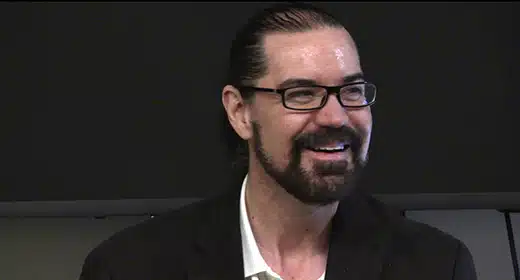Donna Quesada: This is mind boggling and very interesting to me because my way of thinking is…
and please, I’m here to be… correct me… humans are, humans are humans. Whether we’re in Buddha’s day, 2,500 years ago, or yesterday, humans are humans, with the minds that we have. How is it necessary that methods change? I mean, are you saying that meditation is suddenly not enough, or breath work is suddenly not enough? What does updating mean? Have we changed as human beings? That we need different methods now?
Dr. Jeffery Martin: We’ve changed all the time as human beings. There’s a fantastic discipline in the academy involving the evolution of consciousness, and it’s fascinating. They use things like art and stuff like that to really sort of gauge which pieces of human consciousness were even present at different stages of even more modern human development. There’s a point sort of all around the world where all of a sudden perspective enters art among cultures that aren’t talking to each other, and stuff like that.
It’s almost like perspective just sort of switched on, like a visual ability to visually represent perspective just sort of turned on at one point… and there’s all sorts of things like that. The best place to see it actually is in the media, and so many, many years ago, I worked in TV and when I was working in TV and making TV, you could be on a camera shot for a lot longer, and so if you go back and you watch a Sitcom from like the 80s when I was doing stuff like that, and you count how many seconds, so they go on a camera shot and you’re like, 1, 2, 3, 4…
How high can you count before they switch to the next camera, switch to the next camera, switch to the next camera… Right? It was a lot longer in the 80s than it is today and it’s because our attention span… it’s basically if you then go to the 90s and the late 90s and the early 2000s, you just see it getting shorter and shorter and shorter and shorter.
Donna: We just scroll. Now, it’s the proverbial thing about scrolling…
Jeffery: Those are changes in our consciousness. They’re fundamental changes in our consciousness, so you can just see it and how the media has had to engage with people. There’s nothing more democratic, I don’t think. Having worked in the media, they’re going to show you exactly what you want more of, because they want to sell you advertising, and so it’s an eyeball game, right? If you want more, whatever, you’re going to get more.
As long as it’s not illegal in a country to give you that, you’re going to get more of it. They don’t really care because they’re just entirely about advertising dollars, and so the more of their attention they get, the more of those advertising dollars they get. That’s it. That’s the entire ballgame, and so anyway, that’s a great place to see these changes that have occurred in human consciousness, and you can just see it on Netflix by just going back through older series, whoever has older series…
Donna: That means that even our spiritual practices… and I don’t even know if you would call it that… need to change as well?
Jeffery: Exactly, and they don’t, right? People double down on, “Oh, but the poly version of this says whatever. Right?” And they go back, and basically the mistake that all these people have made, it seems like to us, is that they’ve looked back historically and tried to get more authentic. Thinking that the reason these aren’t working as well today as maybe they did back then, is because somehow we’ve lost the authenticity, but that’s not the case. It’s the exact opposite. They just need to be evolved for the modern brain, so that’s the kind of thing we do.
Donna: What is the kind of thing that you do? What kinds of approaches have you found to be more effective than other approaches?
Jeffery: Sure, so we’re looking for a button, right? We do a lot of direct brain stimulation with things like trans-cranial ultrasound, and stuff like that in the lab. These aren’t things that are going to be accessible to the…
Donna: You lay down and you’ve got wires coming out of your head?
[laughter]
Jeffery: Well… or at least you’ve got a… in that case, you’ve got a big sort of transducer on your head pointing at a certain part of your brain, and probably some infrared tracking so that the system knows right where to hit, and you’ve given us an MRI file, or we need an MRI or whatever, so it’s pretty complicated, right? It’s not going to be in anybody’s living room anytime soon, so our focus has always been…
Donna: We’re not meditating on cushions here…
Jeffery: You’re not meditating on cushions in our lab anymore, but years ago, before these technologies… so somewhere around probably 2010, we went through all of the available brain, direct brain technologies, and none of them worked, and we still wanted to do before-and-after research. We were tired of just listening to people who had already been across the line. We wanted before data, during data after data, in terms of people transitioning to fundamental well-being, and so we needed a way to get that.
We knew that there wasn’t anything out there… that these are like literally the most successful methods in the world… maybe worked for 6% of people, right? And there were maybe 2 of them or something, and so we knew that there wasn’t some method that we could just have people do, so we actually did something that in hindsight, seems like we should have done it a long time ago, but we nonetheless went through all the brain zapping stuff first.
[laughter]
Donna: What was it?
Jeffery: When we did our initial survey, we did about twelve hundred people that said they were in some sort of persistent, fundamental well-being in the early days of the project, and one of the things that those people answered on one of the infinite amounts of questions that they answered for us was, what worked for them, and we actually did not process the data for that question until like 2009, 2010, and the reason for that was because we didn’t believe that we would get anything usable out of that. We thought, “Let’s ask that question.” But people are not very self-reflective that are in fundamental well-being. You’re not sitting around thinking about yourself all the time, like the average person is.
Donna: You just feel fine and that’s it…
Jeffery: Yeah, and so you’re at peace. Your mind is pretty quiet. You’re not like… so that’s how people miss it. That’s how people miss that they’re in it… because they’re not self-reflecting the way that they used to, and they don’t even realize necessarily that they’re not self-reflecting the way that they used to. There’s just this change, and you can even frankly miss the change. A lot of very famous spiritual teachers have talked about how it took them weeks or months, and they were in environments where they were looking for it, to realize that they’d had their transition and all of that, right?
The ordinary person that isn’t in those types of environments… it’s pretty easy for them to miss and just go on with their life. Even though that sounds crazy to the average person listening to a podcast like this, but nonetheless, it’s the way it works, so basically, we had this question, and one of our research associates, meaning like a graduate student, in the lab, went back and basically looked at the answers to that question, and it turns out that there were a relatively small number of things that people had actually used successfully to transition, regardless of where they were in the world.
Many of those people had actually used more than one of them and only had one or so work for them, and also typically, when that thing worked for them, it worked for them quite rapidly. Again, going back to things like what was heard in that Theravada Buddhist monastery or whatever, and so we realized pretty quickly from that data.
Donna: What were those things?
Jeffery: We realized pretty quickly from that data that it was a matching game, that it wasn’t enough to have a list of methods… that you had to somehow match up to a method in order to have that really work for you, and if you did match up to that method and have that work for you, it should work for you pretty quickly. We had to go from there, basically to then kind of modifying or adapting some of those methods to the modern brain, in order to be able to have them work more effectively, but unsurprisingly, there are a lot of the things that…
Donna: Can you give an example?
Jeffery: Yeah, sure. Mantras, right? So there’s a million styles of mantra meditation out there… There’s only one that we know of that reliably transitions people to fundamental well-being out of all of those different styles, and the same is true for a lot of these other types of meditation or cognitive science hacks. There’s some cognitive science hacks out there. One of the best things out there is something called Headless Way, which is available free online, people can just Google Headless Way, and Headless Way works quite well.
Donna: You envision yourself without a head, or something like that?
Jeffery: No, it’s different. It’s a little different than that. You sort of… you kind of got to see it, you kind of got to get the whole instructions from them. It’s all online.
Donna: Okay. Can you give the short version?
Jeffery: Well, kind of. The short version might be to… again… there’s different exercises. The most, I guess, core exercise, if there is one, would be to sort of put your… point out to like the floor or something, and then keep pointing closer, and you put your attention on each one of those, and you’re kind of thinking to yourself, What is that?… Oh, that’s the floor… Oh, that’s more of the floor… that’s the tile… there’s my leg… there’s my chest… and then you wind up pointing here. Now I’m ruining it for people by giving this explanation.
Donna: No, not at all. I’m doing it with you, so I’m sure that other people are enjoying it, too. It’s like getting to have a little experience.
Jeffery: Sort of, but the issue with it is, you kind of need to have an epiphany produced by this, right? So you sort of, if you go through the full instructions… what happens when you do that last pointing is, if you’ve gone through the whole process carefully in all of that, you realize your mind wants to say it’s pointing at a face, right? Or it’s pointing at your head, but you can’t see your head, and so a small percentage of people realize that they’re pointing at maybe the capacity for experience, or maybe spaciousness or something like that.
Now that I’ve said that to people, I’ve kind of ruined it for them, right? Because they have to… that has to be an epiphany that you get to, it’s one of the reasons I don’t like to do methods in interviews like this, because now their mind, the primary barrier to awakening, is basically the mind. The mind’s job is to make conceptual objects of things. We think that one of the worst things that people can do is go watch a bunch of videos about awakening. Those people are… they wake up the hardest.
You give somebody our protocol… that has never heard of fundamental well-being, and they transition easy and smooth and it’s no big deal at all, and it’s just like, “Well, of course, yeah, that’s just what happened as the outcome of that, right?” You give it to somebody who’s watched three million hours of non-dual teachers or something, and their mind is constantly putting everything in and analyzing everything, and they’ve built all of these imaginary things in their brain, based on all of these descriptions that they’ve heard from all kinds of teachers or whatever.
That’s actually a monumental disservice that they’re doing to themselves, because what happens is the mind thinks, If I can just understand this experience well enough, I’ll be able to step into it. Just like, If I can understand how to play baseball well enough, I’ll be able to become a pretty good baseball player, right? I’ll know what to do to practice hitting the ball, or throwing the ball, or catching… Or right now, for instance, I’m learning to surf, right? So I’m watching a lot of surfing videos from the world’s best educational programs on surfing, right?
Because I don’t want to spend time learning that the hard way in the water. So, for a lot of things, these have been, for most of our life, the way you learn something is… first the mind learns, it objectifies… it wraps itself around it, and then it translates that into you being able to do it in reality. The problem with fundamental well-being, “awakening,” whatever you want to call it, is that it’s beyond the mind, and so the more knowledge you accumulate about it effectively, the further you get from it, and so, the people who have the hardest time transitioning to fundamental well-being, ironically, are the ones who are putting the most intellectual effort into it, so our programs aren’t intellectual at all.
If you try to even ask us over support for some opinion about something in Theravada Buddhism and how it relates to something that we’re doing or whatever, we’re like, “We don’t answer stuff like that.” And we don’t answer stuff like that because the more we answer it, the lower our transition rate goes. It’s literally just instructions. You come here, you do this… this week for an hour a day, you’re doing this, or for these four days you’re doing this, and then for the next three days in the week, you’re doing this, and it’s like twenty minutes of instruction, or ten minutes of instruction, or nine minutes of instruction or something like that. It’s entirely based on doing.
Donna: Well, I understand… it’s like taking a class on cooking. You can’t just read cookbooks, you’ve got to get into the kitchen and actually get your hands into it and see what happens when you add this ingredient, or cook it longer, or not enough, and I suppose it’s… or swimming, you can’t just read a book about swimming. You’ve got to jump in the water at some point.
Jeffery: Those are all things that still… it’s helpful to have read or watched. It’s like surfing, right? It’s helpful to have learned enough about it in advance to be able to put together the things as you’re doing it. This awakening is a totally different ball of wax than anything else people try to learn, it’s beyond the mind, it’s outside of the mind. I could say it contains the mind as a small part of what it is.
Donna: Because it’s shifting our very way of being and seeing, and hearing, and interacting with the world at a fundamental level.
Jeffery: Yeah. Yeah. Exactly, and so if you go at it and you put a lot of energy and effort into it from within the mind, essentially what you’re doing is increasingly boxing yourself in. Now on the other side of fundamental well-being… once you have transitioned, it can be helpful to listen to some people. It’s sort of like, we hear this all the time in the research. People will have read a bunch of stuff or watched a bunch of stuff, and then they’ll transition and they’ll be like, “Holy cow.” All of that stuff. Like, how my mind was thinking about everything that I’d listened to for the last 20 years… it was just… couldn’t have been more wrong.
Donna: Wow. That’s profound.
Jeffery: Now they’re able to go back through like their favorite book and read it from the perspective of actually experiencing it, and they’re like, “Man, my mind had this completely wrong and I see how it did it, and I see how it interpreted it that way.” “And it couldn’t have done anything other than that because it could never had this experience, so it could have never had a framework for this experience.” Right? And it’s basically like that, so after the fact, then those experiences can be very helpful, and the reason for that is because reading and watching those experiences can be helpful.
The reason for that is because you’re not as self-reflexive as you were before, right? So you’re not sitting around, kind of analyzing your internal experience and whatever else, and so, if you read a book about somebody else’s fundamental well-being experience, or you listen to interviews about someone else’s fundamental well-being experience or whatever, there’s probably aspects of it in there that you can recognize in yourself that you might not have recognized otherwise, because you’re not self-reflexive so much anymore.
That can really help to kind of help someone understand their experience in fundamental well-being, to deepen their experience in fundamental well-being. Even possibly they’re having glimpses of other types of fundamental well-being, and that person might be very rooted in those types of fundamental well-being, so it can make sense of those glimpses and they can kind of understand, “Oh, I see this is another type of fundamental well-being. Yeah, maybe I can sink into my glimpses that I’m having and move into that other type or experience that other type more.” It can help to contextualize things more, but for seekers, it’s kind of the worst thing that they can do.
Donna: I imagine you’re talking specifically about the program that you call forty five days to awakening. You give them things to do every day or is that just in your practice with individual clients? So it’s not all about coming in and having wires in your brain. There actually are practices that you teach and they might be different practices for different people, because you were talking about that there needs to be a fit, right? So it’s not just [inaudible] practice.
Jeffery: Yeah, basically, what we did was, we took the protocol that we invented for our research, so that we could get pre and post data, which was about seventy three. It took four months. It was like three and a half hours of work for people a day, and it transitioned like 73% of people, or something. Which is enough to not have a research project go broke. Because you can’t collect a whole bunch of data, especially in a neuroscience project, where each subject could cost thousands of dollars, to collect data on and stuff.
You can’t have people doing pre-data collection, and then have like 1% of them succeed or 6% of them succeed or something… Right? That’s a guarantee for financial failure for your lab, and so we had to come up with a protocol, basically, that transitioned more or less as many people as we could, and so our original protocol was like four months long. Now it was 3% of people that transitioned in the first week, and so, there was no telling where you were going to transition over the course of that four months, but by the end of the four months, basically 73% of people or so, had transitioned.
Forty five days is a long time… even after we did, we’re doing the data collection on that, and we just… I don’t remember what year it was, honestly, but maybe around 2018 or 2019, we basically had all the data we could ever need from running those experiments, and there was a period where we took like a year off and we just didn’t use the protocol, but people kept coming to us, saying that it was really kind of unfair for us to have removed that protocol from the world, or whatever.
To us it was like, “Well, we got the data we wanted… like we’re scientists.” We were like, not in the course business, and so, that protocol’s done now because we’ve got the data that we needed from it and now we’re moving on to the next thing that we’re researching. And stuff like that, right? But obviously this is a very passionate community of seekers who don’t have a lot of stuff that works for them, and so at that point we made it a little bit more friendly, and we started to allow a really relatively small… like I said, usually… Usually we limit it to about fifty people a month actually, because we just can’t have it take much of our time, and so we allow…
Donna: Your favorite practices… it sounds like mantra is one of your favorites?
Jeffery: Again, a very specific type of mantra.
Donna: Oh, I see.
Jeffery: There’s a lot of different types of mantra practices out there. Even if you just look at the highest level of mantra practice, right? There’s two types of them at the highest possible level of it, right? There’s a type where you repeat it constantly to yourself, so it’d be like one, one, one, one one… something like that, right? And then there’s a type that where you sort of say the mantra, but then you pause and you watch internally to see what sort of happens after you say the mantra, so you might… that’s more boring to look at, right? It would be like you going one, right? And then internally you’re saying, “Okay, what happens as a result of that?” And then the brain goes away from the word one, or whatever the mantra is.
Then as that’s fading, you say it again, one, right? And so, you might say it every second, you might say it every fifteen minutes, sort of, depending upon who you are and where you’re at in that practice. The second type of that mantra practice is way more effective at transitioning people. I don’t even know if anyone’s transitioned from the first mantra practice they have. They haven’t really reported it to us, but the second one that has a relatively high… again, like 3%, 4% success rate, when done within certain systems. Like a transcendental meditation is a good example of a system that uses a method like that.
Millions of people have gone through transcendental meditation over the years, and a certain percentage of those people have had a tremendous success with that and so it’s complicated with these various methods, what we do is we basically use the same protocol that we use to transition people before and after measurement, and we just make it available to however many people we reasonably can a month as part of our overall outreach because in science you really have to be in service to the larger community. It’s not just a situation where you’re just like researching for your own sake or researching for research sake.
You have to… we feel like any good scientist, I think, has moral obligations. One of those moral obligations is to the public, if it makes sense to translate research that is beneficial for people, to the public. Another one is if… I mean, if a graduate student contacts you, for instance, and you’re a professor somewhere, even if that graduate student isn’t at your institution, ethically and morally, you really should communicate back, you should help that graduate student in any way that you can, so I mean, there are just like ethical frameworks and stuff like that in science, and so, the forty five days to awakening stuff is part of our outreach… basically of our core scientific project.
Donna: How do you feel about things like psychedelics, which are making a bit of a comeback as of late, in terms of transitioning our brain state?
Jeffery: We think they’ve got great promise. In fact, we recently did an experiment where we used them for the first time. We did a ketamine experiment where somebody who had worked in our lab was a Ph.D person in neuroscience… wasn’t one of our students, but had come in and worked at our lab part-time in Silicon Valley, when we were based out of Sophia University in Silicon Valley, which is kind of like the main school for transpersonal psychology.
She had since gone on, and I happened to see a random Facebook post, and I saw that she was now a co-founder of a psychedelic company that was microdosing ketamine, to help people with anxiety and depression and stuff like that, and so I contacted her and I said, “Hey, do you think there’s any point in running an experiment where people are doing your microdosing stuff, but then they’re using the research protocol for transitioning to fundamental well-being?”
She’s like, “Absolutely, let’s give it a try.” And so, they were very generous and they basically sort of made it a financial wash on their side, in order for us to look into that a little bit, and we found a very strong benefit for people doing microdosing of ketamine in terms of, frankly, just the well-being measures and stuff that we’ve put people through. We still have every… we still have people take all kinds of different… like depression and anxiety and stress and happiness and positive negative emotion and relationship, and just all kinds of different surveys and questionnaires, and stuff like academic research measures, pre and post the program.
There were benefits for all of that type of stuff, but also on transitioning, and the people that chose to participate in that were kind of the hard luck cases, and so, the fact that they made that kind of progress we thought, was really nice, and so, I’m sure this year we’ll do more on that front. Now, on the other side of that, there’s, I think, an issue with psychedelics, in terms of how they’re normally used, and so, typically how they’re used is at breakthrough doses, and so, people have some sort of transcendent experience or whatever.
One of the issues with that is that the brain is fundamentally a learning machine, and if you just give it a bunch of a substance and it lights up all over the brain, the brain can’t really tell what produced the transcendent experience in this case, right? It like, “Well, it could have been any one of all of this stuff that was bound all over the brain in all kinds of different places.” And so, the problem with psychedelics traditionally has been that you’ve had, sort of, this societal arc that people follow.
They do psychedelics, they have transcendent experiences, they get interested in it. Eventually they realize I’m tired of being on the psychedelic rollercoaster of Oh, there’s a transcendent experience. Oh, now I’m off of psychedelics… can’t get back to the transcendent experience… Oh, psychedelic, transcendent experience… Right? And then they go into meditating, so they go from psychedelics usually, to meditating, and they hope to get it there, and so on and so forth. So, in that traditional sense of psychedelics, we have not seen any benefit to people doing psychedelics or not doing psychedelics, in terms of persistently transitioning to fundamental well-being. That was one of the first things that we looked at, research question wise.
Donna: Is it sustainable, in terms of it being a positive and consistent benefit in your life?
Jeffery: Right, but the data that’s come in even just recently, it’s mixed. I mean, there’s one of the problems that the psychedelic world is having right now is that a lot of the… there’s just zillions of dollars pouring into investment, into companies in that space for commercialization of these types of things, right? And now you’ve had some of the early phase 2/phase 3 trials coming out of these companies, and coming out of that world, and they just don’t quite look as rosy as everybody thought they would. They’re not necessarily…. they’re not beating like normal antidepressants, and so, I think if you’re just in, sort of… can we make people not depressed or not anxious, that are clinical populations and stuff?
I think it’s an open question on the psychedelic side from this standpoint, but from our standpoint, one of the things that is interesting in our data is that the people who are more likely to transition are happier usually, and so people who come in happier are more likely to transition to fundamental well-being than people who aren’t happier. Now, that doesn’t mean you’re going to have people come in that are suicidally depressed and they’ll still transition to fundamental well-being… realize we’re talking about averages here, but on the average, kind of the happier you are, the more likely you are to transition to fundamental well-being in our data, our pre-post data, right?
Donna: Why is that?
Jeffery: Which is across thousands of people at this point. We don’t really know. Nobody knows. It’s just one of those interesting correlations in the data, and so, one of the reasons that we were thinking, well, geez, if there’s… if low dosing ketamine, and if microdosing ketamine into a point where it doesn’t impair you or anything like that, actually improves anxiety and depression, and improves people’s well-being… maybe if they have lower… if they have high anxiety, low well-being, stuff like that, before the program, maybe it’s a good idea for them to microdose under clinical supervision of their program… administered by doctors and all of that…
Let’s let them go through what they would normally do in a clinical setting, or in a clinical type of relationship, and hopefully those people will get a boost in their well-being, then they can come into the protocol, and it should… and will it give them a higher likelihood of success, and so that was the logic that we were approaching that from.
Donna: It kind of flies in the face of the spiritual idea of the dark night of the soul being the impetus for spiritual growth. What you’re saying is… suggesting that something like the opposite is true… the ones that have a higher baseline tend to do better, kind of, getting over that heap into a place of permanent well-being, or at least lasting, inconsistent well-being…
Jeffery: Better in our protocol, right? So I think, probably, more people transition to fundamental well-being from suicidal level depression than anything else, way more than from meditating or anything else, and the reason is because there’s a lot more of those people than hardcore spiritual seekers who are trying to transition to fundamental well-being, right? And there are like famous spiritual teachers who have talked about this stuff, right? The razor blade is like, right at their wrist and then all of a sudden boom, or they wake up in the hospital having had their life saved, and it’s a transformational experience for them, or whatever.
Donna: Yeah, yeah.
Jeffery: It makes sense, if you think about it. I mean, at that point, you’ve got to have pretty well objectified the self, in order to want to kill it, and so, if you’ve really gone down that…
Donna: That’s interesting.
Jeffery: Low from a psychological standpoint, but for our protocol, we’re not really dealing with that type of population. We’re dealing more or less with ordinary people who are just lots of times spiritual seekers, and then from there, it’s become lots of people that they refer, like their family members and friends and stuff like that, who have often no frame of reference for this, and who just do it because their friend is like, “You should do this.”
[laughter]
Donna: Yeah… Yeah.
Jeffery: They just want to stop their friend from pestering about it, or whatever, and so, in our protocol, at least, it’s a different story.
Wellbeing Research – For over 15 years Jeffery has conducted the largest international study on persistent non-symbolic experience (PNSE), which includes the types of consciousness commonly known as: enlightenment, nonduality, the peace that passeth understanding, unitive experience, and hundreds of other terms. This resulted in the first reliable, cross-cultural and pan-tradition classification system for these types experience. It also led to the fundamental discovery that these were psychological states that had been identified and adopted for thousands of years by many cultures and belief systems. They were not inherently spiritual or religious, or limited to any given culture or population, and could be molded in many ways to shape the experience. More recently, he has used this research to make systems available to help people obtain profound psychological benefits in a rapid, secular, reliable, and safe way.
Read and Watch Part 3 Here: Awaken Interviews Dr. Jeffery Martin Pt 3 – Four Main States of Fundamental Well-Being
Read and Watch Part 1 Here: Awaken Interviews Jeffery Martin Pt 1 – Fundamental Well-being

















































